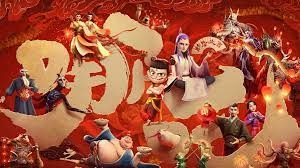The animated Chinese blockbuster Ne Zha 2, inspired by traditional mythology, has broken multiple box office records, becoming the highest-grossing movie in China’s history.
The film, which follows a rebellious young deity battling dragons, is the first ever to surpass $1 billion in a single market, dethroning Star Wars: The Force Awakens, which earned $936 million in the U.S. in 2015.
Released on January 29 during the Lunar New Year holiday, Ne Zha 2 has revived China’s film industry after a sluggish 2024, when box office revenue dropped by 23% compared to the previous year.
Cultural Resonance and National Pride
A sequel five years in the making, Ne Zha 2 draws from the 16th-century novel Investiture of the Gods, tapping into growing Chinese interest in domestic stories and pride in the country’s advancements in animation.
“Ne Zha is deeply rooted in Chinese culture. We resonate with the characters and background,” said 36-year-old moviegoer Gao Zhen. Many audiences also view the film’s high-quality animation as a sign that Chinese cinema is rivaling Hollywood in visual effects.
The film quickly surpassed previous box office champions, including The Wandering Earth (2019) and The Battle at Lake Changjin (2021), in just nine days. Its director, Jiao Zi (Yang Yu), initially sought international collaborations but ultimately relied on an all-Chinese production team.
A Global Breakthrough?
While Ne Zha 2 has fueled confidence in China’s film industry, its global reception remains uncertain. Unlike internationally recognized folklore such as Journey to the West, the Ne Zha legend is less familiar to audiences outside China.
Still, many hope the movie will introduce more viewers worldwide to Chinese culture. “Foreign audiences may not understand it as deeply, but I hope this film helps them appreciate Chinese stories,” said media worker Qu Peihong.
With its themes of rebellion and nonconformity, Ne Zha 2 follows the trend set by other Chinese hits like the video game Black Myth: Wukong, proving that traditional tales infused with modern storytelling continue to strike a chord with audiences.



